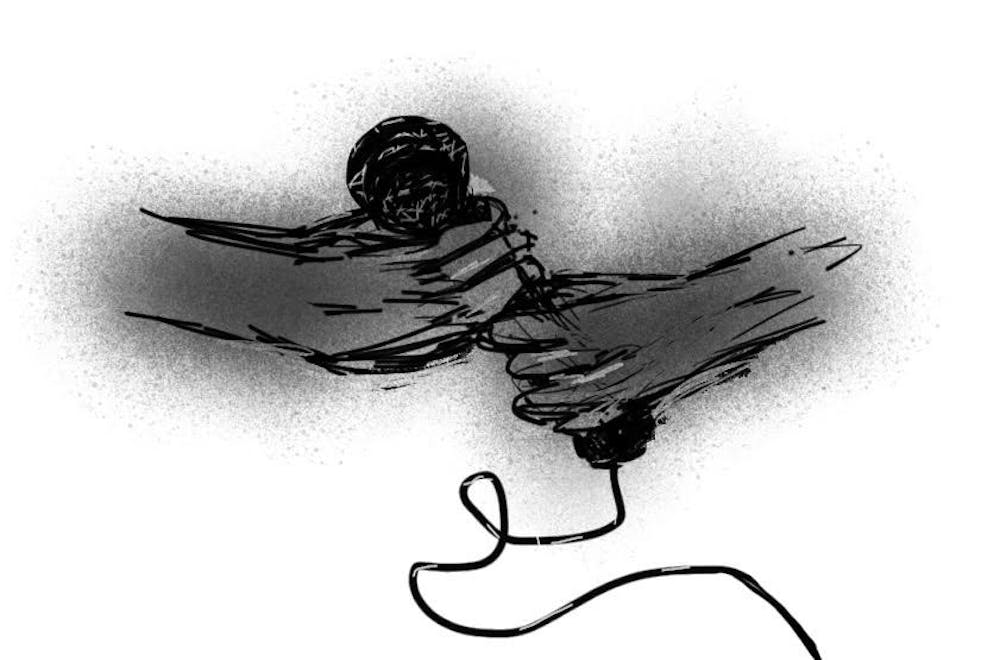Poetry is best when it speaks loudly.
That’s what happened Thursday night at the 2017 Youth Poetry Grand Slam at AS220 where poetry echoed off the walls and checkered stage, splashed against the red curtains and landed with impact into the ears of listeners cramped closely on folding metal chairs.
The slam included eight contestants under the age of 19, all of whom performed original spoken-word poems to compete for five spots on the Providence Brave New Voices team. The New Voices team will be trained by poet-coaches this summer and compete in the annual Brave New Voices International Youth Poetry Festival in Oakland, Calif.
This slam was more than just a competition — it was a stand-alone exposition of race, religion, sexuality, politics, identity and personal experience told through the diverse voices of Providence youth.
First to perform was Charlotte Abotsi, co-director of Providence Poetry Slam and the night’s emcee, who introduced the organization and set the tone for the night. She opened with a poem beginning with “My pediatrician taught me to hate my body,” which explored coming to terms with her body and the appropriation of black women’s physical features.
Black identity was the focal point of poems by several other “sacrificial poets” — past Brave New Voices team members who performed in order to prepare the “five random as fuck judges we plucked from the audience” for scoring the upcoming student performances, Abotsi said.
Sin Seven, one the sacrificial poets, twisted Edgar Allen Poe’s famous poem “The Raven” to dissect America’s prison-industrial complex. “Maybe we’ve been saved from shackles, but we’re still in cuffs,” he said.
Seth, a past poet-coach, explored the racist undertones of football and the important political lessons that young “black and brown boys” can learn from the sport. “They never wanted those black boys to win — and that’s an analogy for life,” Seth said, referring to the Panther’s loss in the Superbowl.
The student competitors continued the tone. “Citizens, the White House is in need of renovation,” said Gemini, the first contestant, who rapped rhythmically, nonchalantly tossing written notes to the floor as he walked onstage.
Other performers also expressed political unease, including “B,” who asked, “America, how can I be proud of you?” after beginning one a poem with a skeptical rendition of the pledge of allegiance.
“Funny how anonymity is a synonym for black struggle,” said Blessed Sheriff ’19 in a powerful poem about Anarcha, the victim of hundreds of medical experiments and operations by the “Father of Gynecology” Marion Sims. Sims’ legacy is remembered in statues and history books, but the story of Anarcha, the slave whose body led to his discoveries, is not.
The Providence Poetry Slam itself is charged with politics — it is funded by the National Endowment for the Arts, which the Trump administration has threatened to defund, Abotsi noted.
Other poems were less political and more personal, focusing on struggles with sexuality and the ramifications of identity in an unaccepting society. Alyssa performed poems on her identity — unapologetically black and gender-fluid. Keely presented a list of “ten things I’d like to ask my boyfriend’s parents,” which began powerfully with “when your son told you he wasn’t a girl...” and went on to discuss the depression incurred by having an identity that is ostracized by parents.
Depression was a topic that received multiple platforms that night — shattering the silence around an issue often kept in the dark.
“Life’s about sadness sometimes,” said Jazlyn, who performed a poem about feeling trapped in the city of Providence, where the skyline can feel like unconquerable walls. Cleo too showed the strength in vulnerability, admitting “I’ve been dead for a while now” in a poem about reluctance to share poetry.
Religion — specifically its relation to sexuality — was also a central theme of the night, sometimes acting as a societal villain and sometimes as a source of hope. While Gemini rapped, “Does God forgive? It ain’t hard to ask,” “B” commented that “your hungry God was eating me alive” in a poem about reluctantly attending church as a child.
At the end of the night, scores were added and the newest members of the Brave New Voices slam team were announced: Alyssa, “B,” Jazlyn, Cleo and Blessed, who won the coveted title of Grand Slam Champion. It is the first Brave New Voices team composed of entirely “black and brown girls,” noted Chrysanthemum Tran ’16, who will coach the team.
Rather than giving each artist a rating, the night should be remembered for the art produced, Abotsi noted.
“This is a very vulnerable place to be in,” she said. “Applaud the poet, not the score.”
In addition to youth slams, Providence Poetry Slam organizes events on the first and third Thursday of every month at AS220. Events include open mics, feature performances by visiting artists, youth workshops and competitive poetry slams for all ages.





